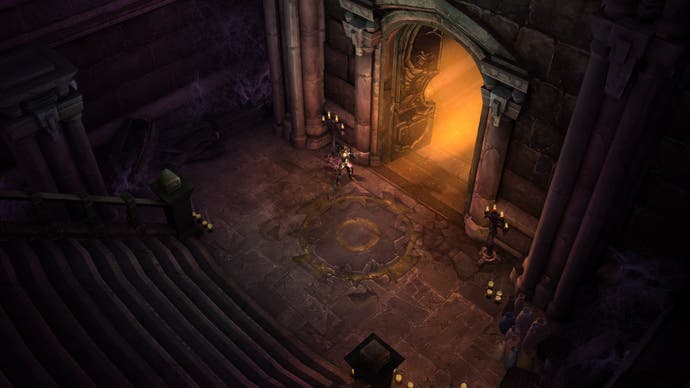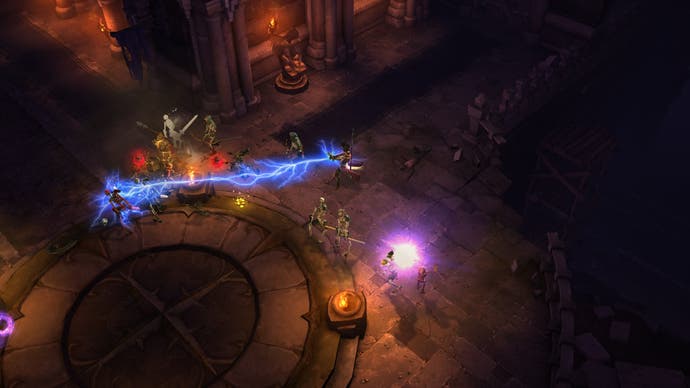Diablo III Beta
What's new, what's changed, what's in the test.
Skilling in the name
Each character now has just six active skill slots (and three powerful passives, replacing the more complex traits from last year). Skills simply unlock as you level up, as do the slots - you start with two. Skill points and character respecs have followed attribute points into the bin, and skills can be swapped in and out of slots completely at will. The system is breathtaking in its simplicity and flexibility.
Wilson explains the change of heart. Players faced difficult choices on whether to go deep or wide in their skill investment - yet those choices were subsequently trivialised by the ability to respec, and the whole system conflicted with the Diablo player's desire to swap disposable early skills out for shiny new ones.
"What the system wanted to be [is] almost, in some ways, more like Borderlands," he says. "If you played Borderlands, the primary thing that you're doing all the time is shooting a gun. And that changes frequently because you always get new items that change what you're doing, and that's what keeps the combat really interesting. Diablo is the same model, except we don't base our skills off weapons, we base them off of the skill system.
"If changing [skills] was a really big deal, we're basically telling the player, 'You're not really supposed to do that.' But they are supposed to do that. What's the problem of just letting players change the skills whenever they want?"

The runes that increase skills' power and alter their effects are the counterbalance to this freedom: this is where choice, investment and customisation come in, and where long-term players can start to build highly specialised variations of the classes.
Wilson demonstrates the amazing flexibility of the rune system by turning his wizard, normally the definition of a fragile 'glass cannon' caster, into a melee-focused battle mage - a build that took him a couple of hours to design ("it was a lot of fun") and for which he rejected another seven entirely viable skills. A ranged attack is transformed by a rune into orbiting armour. Other skills gain healing properties and reflective damage, have their delays removed, or leave crowd-controlling frost trails on the floor.
"One of the things we tried when we came up with each one of the classes is to come up with as many different alternate fantasies as we could think of for that class and then try to make sure that we accommodated those. We don't pretend to know all the variations... It's no mistake that there's a lot of options for making a battle mage with the wizard - it's because I think that's cool," Wilson says.
It's also a "highly inadvisable" way to play the class, he admits, but he's happy that playing Diablo doesn't have to be about 'theorycrafting', the obsessive fine-tuning of optimal character builds at the heart of World of Warcraft raiding culture. "One of the things I've always liked about Diablo is that, to a certain degree, the audience doesn't care as much about what's the best. They care a lot about what they want to make."
The many deaths of the Skeleton King
If Diablo III's systems are the last word in finely-crafted freedom, then the same unobtrusive care is being taken with the game's storytelling, a neglected element in the previous two games in the series. Chris Metzen, Blizzard's world-builder in chief - or senior vice president of creative development to you - thinks that's been a waste.

"The dirty secret is, Blizzard North, who built most of those games, they didn't love story," he tells me. "It facilitates this and that, but they were much more about the items and the slot-machine type gameplay of it all... It was always just a bitch to put you in the midst of the narrative for Diablo games.
"I've always held that Diablo was by far the most interesting universe we were sitting on top of. I've always believed this. 'Cause you know, Warcraft and StarCraft have their roots in... the zeitgeist of pop fantasy and science fiction, in many ways their worlds are built to substantiate any wacky idea. Especially Warcraft, goblins with jet bikes and all that kind of shit. I really think [Diablo] has the most thematic potential of any of our universes to be... I don't know, a bit more personally engaging."
